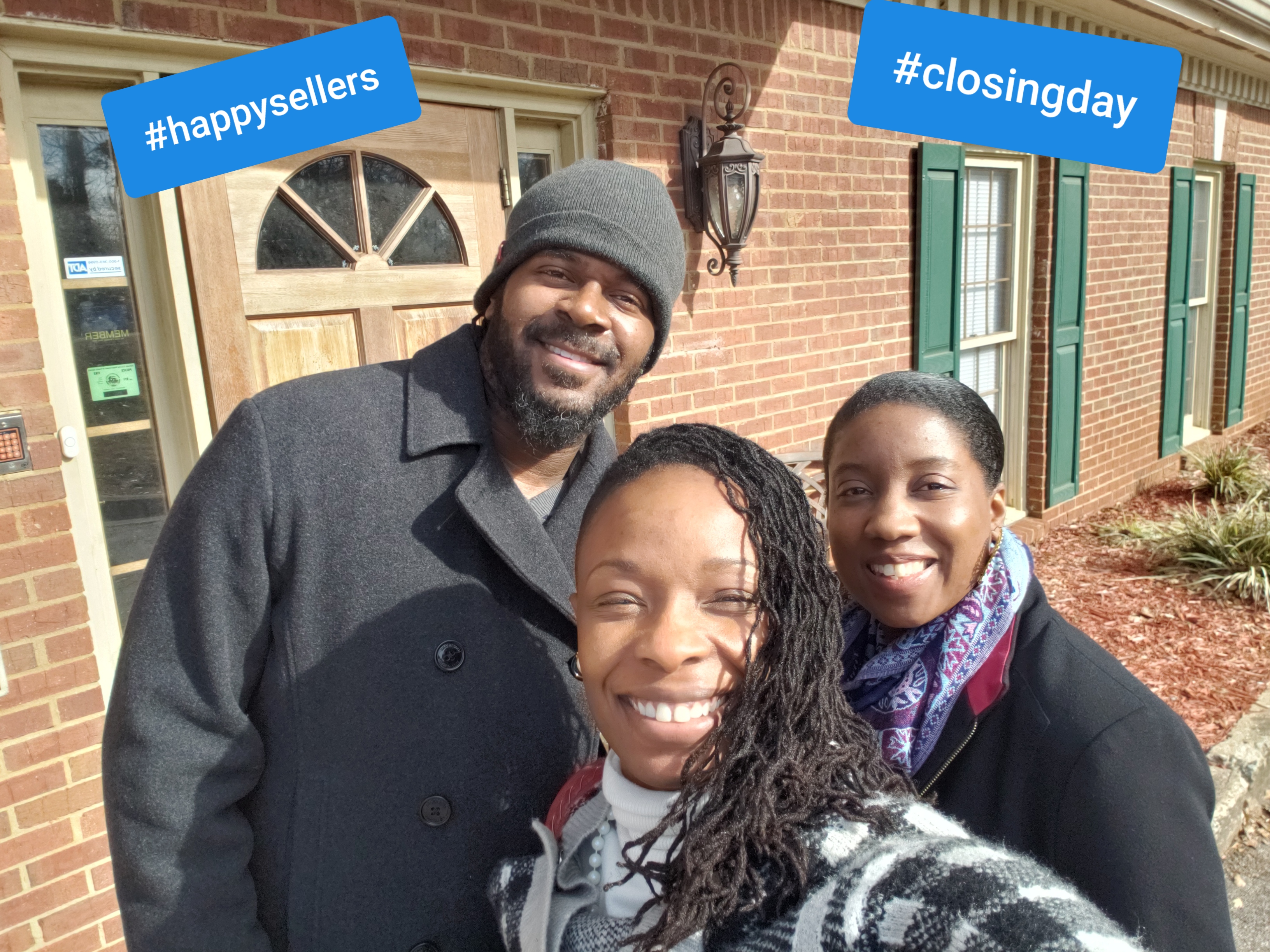Congratulations to my #happysellers!
We are all smiles because they closed on the sale of their 1st home (their starter home) which they lived in for 13 years. Besides all that comes with selling and moving, they also had an emotional attachment having raised their children and tons of memories made in the home for all those years (which is understandable). As is necessary in life, change comes and change can be a good thing. Now that they have sold their starter home, we are currently on the hunt for their dream home.
Are you ready to sell your starter home and buy your dream home? Working with families and individuals in transition is my specialty and I’d love to chat with you.
You can reach me at (404) 857 – 2508 or by email info [at]soldbynat.com. Also check out my YouTube channel for more helpful info.
With every transaction, I strive to become a better real estate agent and provide better service. From this transaction, something dawned on me… Home-buyers get all the attention! You always hear about First-time Home-buyer Seminars, but you rarely, if ever hear about seminars for sellers. And if you do, they cover what sellers need to know to get a contract, not what happens after the contract to the closing table.
These savvy sellers asked good questions that were a standard part of the process, but it identified an area of improvement in my processes. From here on out, once my sellers go under contract, I’m going to have a sit-down or conversation with them to go over what they can expect from contract acceptance to the closing table. I’m even going to record a video that I can send them going over these points that they can review at their convenience and have it to refer back to.

Now that you are under contract, here are 10 things you NEED to understand…
1.Inspection
Dear Mr./Mrs. Seller… know that no matter how well you have maintained your house, the inspection report WILL find issues you are not aware of or don’t see on a daily basis. No one (besides an inspector), comes through their house for house with a fine tooth comb at any point in their home ownership. Prayerfully, whatever they find will be relatively minor and low cost.
A. The buyers have X amount of days to complete their home inspection. Time frame was agreed upon in the contract.
B. Sellers also need to understand that if the buyer terminates the contract at anytime during their due diligence period, they can do so and retain their earnest money deposit.
For this reason, if my sellers will be buying a new house, I urge them to wait until we get past the Due Diligence period to start looking. Waiting until the appraisal is completed is also a good thing. Why? In most cases, contracts fall apart during the inspection and appraisal periods. Getting past those 2 items gives you more reassurance that the deal will make it to the closing table.
DISCLAIMER! It is not a guarantee. It’s not a guarantee until AFTER closing, and in some states until the loan has been funded and escrow disbursed.
C. During the home inspection, it is best the buyers leave the house. Home inspections will take 2-3 hours for a 2,500 sq ft. It will take longer is the house is bigger, has a basement, crawlspace etc.
D. Once the home inspection is completed, the inspector will send the report to the buyer. The buyer will review it with their agent and decide what items, if any, they will ask you (the seller) to repair or ask for compensation to have them fixed after closing. Compensation will come in the form of closing costs (additional if they are already included in the contract) or a reduction in sales price.
*FYI – If you agree to have the work done, it should be done in a professional workmanlike manner. Some buyers may stipulate that the worked be completed by a licensed contractor (general or specialty, i.e. HVAC technician, depending on the item being repaired. Basically… Uncle Joe should not do the work. Buyers may also request proof the work was done by invoices and receipts. This is especially good for those items being repaired that can’t be viewed easily (i.e. electrical, roof work).
All of the inspection negotiations should be done WITHIN the due diligence period to protect the buyer’s earnest money. If the due diligence period is 10 days and the buyer tries to negotiate on day 11, you both can’t come to terms, and the buyer terminates the agreement, you (the seller) can retain their earnest money. A.K.A. The buyer loses their earnest money. Most sellers see this as compensation for their home being off the market and therefore the additional time it will take to sell being that it has to be relisted.
When the house is relisted, basically, it goes back on the market and the showing process resumes until another contract is received.
Click HERE to watch a video for the 12 Items that are common on inspection reports. Most are deferred home maintenance.
2. Start Packing & Making Moving Arrangements

If you haven’t done so already, after the due diligence is a good time to start packing. Some sellers even wait until after the appraisal has been conducted and results come back to start packing. It really depends on your feel of the buyers and the deal (as checked on & update provided to you weekly by your agent), as well as how much stuff you have to pack.
*Don’t be fooled. It may not look like much, but everyone realizes differently once they get underway and see how much stuff they’ve accumulated over time.
3. Appraisal
Dear Mr./Mrs. Seller… know that you can have 5 different appraisers conduct an appraisal of your house and all 5 of them can come back with a different amount. Their is no one formula and the comps (comparables) each appraiser uses may not be the same and if they are, they may assign different values. They however, should be within the same range.
Once the appraisal is conducted, it will be a few days until you hear anything. The appraiser prepares the report and submits it to the lender. The lender then processes it and a copy is sent to the buyer. The seller’s agent will just be notified that the house appraised. They don’t get a copy of the report UNLESS the house appraises for less than the contract price.
If this happens, depending on the contingencies in your contract, normally, the seller can agree to drop the price or agree to let the buyer out of the contract and give them back their earnest money.
Depending on the type of loan the buyer had, the appraisal may stick with the house. 120 days for FHA. If you (the seller) are time-pressed to sell, it may make sense to go ahead and reduce the price. If there is no urgency to move and the difference between the contract price and appraisal price is more than you can stomach, you may take it off the market and try selling at a later date, or relist it and look for a cash offer or different loan type (in the case of an FHA loan).
In some markets (highly competitive), buyers may be willing to keep the contract price and pay the difference in cash. Or the buyer and seller split the difference. Or the seller agrees to reduce and adjust or remove the closing costs if they were contributing (the buyer will have to agree to this).
In most cases, there are ways to keep the deal on track even if the appraisal comes in lower than expected.
Another option is to fight the appraisal. Basically the agent(s) are justifying to the lender why the appraiser’s report was off. They must submit comparable properties to show this and fill out the lender’s form (if they have one). This process is more times unsuccessful, than it is successful, and the process will take a few days to a week or so. Meaning timelines will be delayed and stress will be added. Welcome to the wonderful world of #realestate!
4. After Inspection & Appraisal Periods

After you get past these major milestones, on the seller side, you are addressing any repairs you agreed to. On the buyer side, they are continuing to work with their lender, clearing any conditions from underwriting and working towards a C2C (Clear to Close).
Mr./Mrs. Seller… I hate to tell you this, but the reality is until you get the Clear to Close, it’s not a done deal. Unfortunately, things can happen that cause the buyer’s loan not to be approved. In rare instances, a buyer loses their job or the lender didn’t catch something on the front and now it’s coming up as an issue. (So was the case for the buyers who purchased the house from the sellers mentioned at the beginning in a previous transaction).
5. Clear to Close (C2C)
These are the words every buyer and seller want to hear.

This means that the lender has fully approved the buyer’s loan and you can proceed to closing. Please take a PRAISE BREAK and REJOICE. Well… rejoice. We’ll save the full out celebration until AFTER closing ;-).
6. Utilities
At our listing appointment (when you interview me and realize I’m the best agent to sell your home – wink wink ;-), I give you a Utilities Form. This form is for you to provide the utility information to the new buyers. On it, I advise:
*Please call at least one week in advance of closing/move-out to schedule utilities to be taken out of your name. Buyer will not be able to schedule utilities to be put in their name until after you have called.
Leave utilities in your name through the day of closing or the last day that you will occupy the property, whichever is later.
Unless otherwise noted, it is the sellers responsibility to leave the utilities on THROUGH closing. Why?
1) They need to be on for the appraiser.
2) The buyer may negotiate repairs being done and they will come back before closing (or whenever you agree the work should be completed) to confirm the repairs were done as promised and correctly.
3) They should be on for the buyer to complete their final walk-through.
*The lock box also needs to remain so the buyers and their agent can get in to do the final walk-through. Your agent will pick up their sign and lock box after the final walk-through and prior to closing.
7. How the house should be left
As stated in the special stipulations when I am submitting an offer for a buyer:
Seller agrees that the home (interior and exterior) shall be vacant at the time of closing and in broom-swept condition, free of garbage and debris with all of Seller’s personal property removed.
If you agreed to leave the refrigerator and/or washer and dryer in the contract, those are to remain in the house. If you have a nice chandelier that you plan on keeping, it MUST be noted in the listing and listing paperwork that the chandelier seen will be removed and replaced with the original chandelier or a comparable one.
*In these cases, I advise my seller to remove it before listing so there is no confusion. If it is too cumbersome to move prior to listing, provide a picture of what it will be replaced with.
8. Closing Costs & Prorated Costs
Closing costs and any other monetary agreements in the contract will be handled by the closing attorney. The seller DOES NOT have to write a check at closing IF they will be receiving proceeds. The closing attorney will prepare a CD (Closing Disclosure) or Settlement Statement that breaks down all of the money involved in the transaction.
*Ideally, you should get this disclosure a few days before closing, but as the seller, sometimes you’ll get it the day of closing and in some cases at the closing table. Not ideal, but it happens.
9. Closing Day

Bring to closing:
Your ID’s and checkbook (if you owe).
All keys, garage openers, and any warranties or manuals you have. Bring anything the buyer needs to have and this is the time to explain and share any useful information with them.
*Refrain from bragging about how much money you made on the sale of the house (by selling it to them). Also refrain from sharing any negative views like telling them how awful the neighbors are. This would be an ultimate #joykiller.
10. REJOICE
Once all paperwork is signed, keys are passed, checks are distributed and pictures are taken, R.E.J.O.I.C.E!
You’ve made it!!!! Congratulations!!!

Are you ready to sell your starter home and buy your dream home in Georgia?
Working with families and individuals in transition is my specialty and I’d love to help you plan and execute you next move!
You can reach me at (404) 857 – 2508 or by email info [at]soldbynat.com.
Not local? No problem! I have a network of Realtors that will take great care of you like I would. I’d be happy to refer you to one.
Also check out my YouTube channel for more helpful info!

